About The Hitchhiker's Guide To The Galaxy (original) (raw)
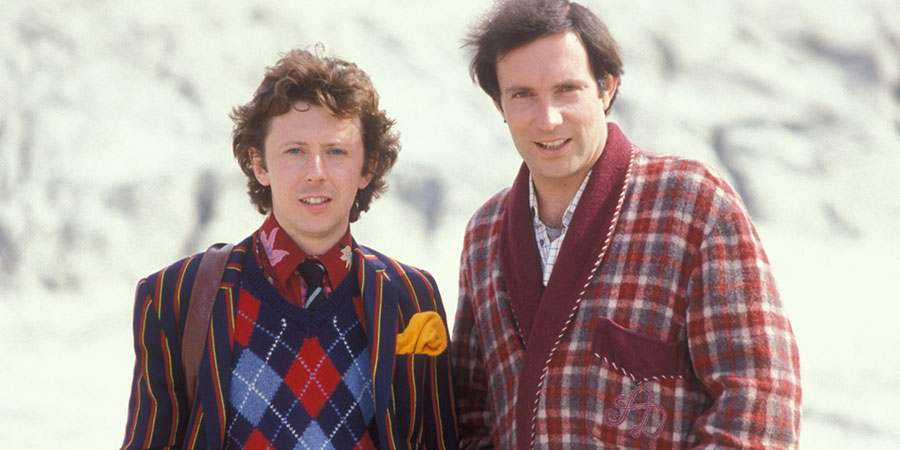
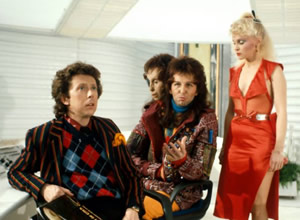
The Hitchhiker's Guide To The Galaxy is a wholly remarkable, certainly the most successful book, ever to come out of the great publishing corporations of Ursa Minor. More popular than The Celestial Home Care Omnibus, better selling than Fifty-Three More Things To Do In Zero Gravity, and more controversial than Oolon Colluphid's trilogy of philosophical blockbusters Where God Went Wrong, Some More of God's Greatest Mistakes and Who is this God Person Anyway?, it's already supplanted the Encyclopaedia Galactica as the standard repository of all knowledge and wisdom, for though it has many omissions and contains much that is apocryphal, or at least wildly inaccurate, it scores over the older, more pedestrian work in two important respects...
First, it's slightly cheaper; and secondly it has the words "DON'T PANIC" inscribed in large friendly letters on its cover.
In order to fully understand the book, it is best to tell the story of some of the minds behind it. A human, from the planet Earth, was one of them, though as the story opens he no more knows his own destiny than a tea leaf knows the history of the East India Company. His name is Arthur Dent. He is a six-foot tall ape descendent and it all started one Thursday morning when someone tried to demolish his home.
His best friend, Ford Prefect, turned out not to be descended from an ape, but to have come from a planet somewhere in the vicinity of Betelgeuse, and not an out-of-work actor from Guilford after all. He was a researcher for The Hitchhiker's Guide To The Galaxy who had come to write up an entry for the Earth. He planned to stay for two weeks, but got stuck for 15 years.
On this Thursday morning, Arthur discovered that his house was about to be demolished to make way for a new bypass. A few moments later, he and Ford left the Earth, just before the whole planet was demolished by the vile and bureaucratic Vogons to make way for a new hyperspace bypass. With his home gone, Arthur decides to travel with Ford, working on The Guide. On his journey, he dines at The Restaurant At The End Of The Universe, meets the most depressing robot in the universe and discovers the shocking (and somewhat disappointing) ultimate answer to life, the universe and everything.
The Story of the Guide
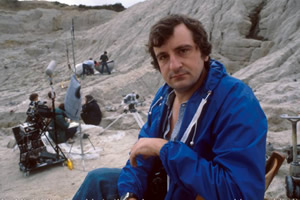
The story of the creation of The Hitchhiker's Guide To The Galaxy is almost as confusing and full of contradiction as the story of the Guide itself. Although this version of events is now disputed, Douglas Adams claimed that the idea first came to him when he was a penniless hitchhiker lying drunk in a field in Innsbruck, Austria. It was 1971 and he was wondering where he could go that was cheaper than Innsbruck and didn't do the sort of things that Innsbruck had done to him that day. As he lay there clutching his battered copy of the Hitchhiker's Guide to Europe, the stars began to come out when he thought that if only someone would write a Hitchhiker's Guide to the Galaxy, he for one would be off like a shot. He then promptly fell asleep and forgot about it for six years.
After obtaining a degree in English from Cambridge University, Adams' pet project became an attempt to do something that combined comedy and science fiction, despite the fact that no one was interested. "We don't do sci-fi sitcoms" seemed to be a general rule in the industry, on the grounds that they couldn't be sold or marketed - and thus Adams encountered many difficulties trying to get the series off the ground. (It should be noted that Rob Grant and Doug Naylor encountered similar difficulties when trying to sell their pilot of the now immensely successful sci-fi sitcom, Red Dwarf.) Finally, a BBC radio producer named Simon Brett had the same idea and sounded Adams out about it, unaware that he had been thinking along the same lines. Although Brett only produced the first episode before leaving the BBC, he was the one to get it off the ground with Geoffrey Perkins succeeding him and producing the remaining episodes.
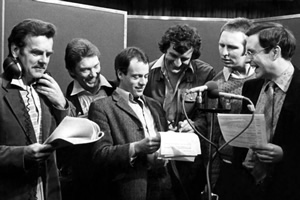
The Hitchhiker's Guide To The Galaxy has existed in almost every form imaginable - first a radio series, then a book, record albums (different to the radio versions), a television series, various stage productions, a computer game, a towel and a major motion picture - each one expanding on or compressing previous versions, using some aspects, flatly contradicting others and completely ignoring the rest.
The original idea was quite different to what it became and was to be entitled "The Ends of the Earth", where at the end of each episode the Earth was destroyed in various ways. After writing the pilot where the Earth was demolished to make way for a new hyperspace bypass, Adams realised he would need someone from another planet to tell the audience what was going on and to give the story some context. This led him to create the character Ford Prefect and when thinking up a reason for him to be on Earth in the first place, a random six-year old passing thought from Innsbruck caught up with him and he realised that Ford could be a roving researcher for The Hitchhiker's Guide To The Galaxy. Needless to say, the rest is history.
The first 6 fits of the radio series were broadcast in March 1978 and a seventh followed around Christmas that year. In the Autumn of 1979 the first Hitchhikers book was published, which expanded on the events of the first 4 fits of the radio series and in January 1980 the last 5 fits of the radio series were aired. The following Autumn the second book, entitled The Restaurant At The End Of The Universe, was published and was a contracted version of the events from fits 7, 8, 9, 10, 11, 12, 5 and 6 of the radio series - in that order. Which brings us to January 1981, when the 6 part television series was aired and basically comprised of the events in the first 6 fits of the radio series, or to put it another way, all of the first book and the second half of the second book. Another three books (Life, The Universe And Everything; So Long, And Thanks For All The Fish; and Mostly Harmless) followed after the TV series finished, and were later adapted for the radio between 2004-2005.
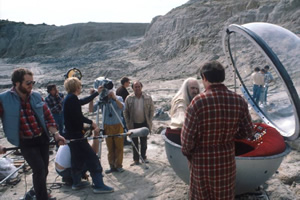
The original television series was first considered "unfilmable" by executives at the BBC, but the series was eventually made, with Alan J. W. Bell both directing and producing, with John Lloyd as associate producer. The adaptation of the radio series had some difficulties, with many episodes over-running. There were also cast changes between the radio and TV series. Ford, originally played by Geoffrey McGivern, was now played by David Dixon because he looked more like the character. Susan Sheridan, who played Trillian on radio, was not available to play the part so Sandra Dickinson took over the role. Dickinson, who was blonde and American was no doubt the inspiration for the character of Tricia McMillian in Mostly Harmless.
There were plans to make a second series, based on Adams' failed Doctor Who script "Doctor Who and the Krikkitmen". However, due to differences between Adams and the BBC, these plans did not come to fruition. Reasons differ for why it was never followed up. They include the small budget, problems with the scripts, and arguments with Bell and/or radio producer Geoffrey Perkins. The script was later adapted for the third book in the series.
Although it does now attract criticism on occasion (particularly for its 'cheap' appearance (although this is down to the influence of modern special effects and picture quality rather than issues inherent with the show) and apparent shortcomings in comparison to the radio fits), the series was well received by critics at the time. It won a Royal Television Society award for "Most Original Programme" and indeed several BAFTAs for its graphics and editing.